| Listing 1 - 8 of 8 |
Sort by
|
Book
ISBN: 3451276267 Year: 2001 Publisher: Freiburg Herder
Abstract | Keywords | Export | Availability | Bookmark
 Loading...
Loading...Choose an application
- Reference Manager
- EndNote
- RefWorks (Direct export to RefWorks)
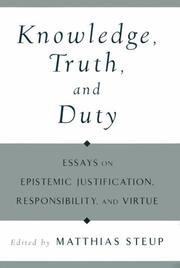
ISBN: 0195128923 0199833761 9786610472192 019802956X 1280472197 1423727509 Year: 2001 Publisher: Oxford Oxford university press
Abstract | Keywords | Export | Availability | Bookmark
 Loading...
Loading...Choose an application
- Reference Manager
- EndNote
- RefWorks (Direct export to RefWorks)
Duty. --- Justification (Theory of knowledge) --- Justification (Theory of knowledge). --- Duty --- Deontology --- Obligation --- Knowledge, Theory of --- Responsibility --- Supererogation
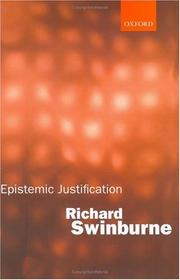
ISBN: 0199243786 0199243794 0191598526 9786611944117 1281944114 019152946X 9780199243785 9780199243792 9780191529467 9780191598524 9781281944115 6611944117 Year: 2001 Publisher: Oxford New York Clarendon Press Oxford University Press
Abstract | Keywords | Export | Availability | Bookmark
 Loading...
Loading...Choose an application
- Reference Manager
- EndNote
- RefWorks (Direct export to RefWorks)
Richard Swinburne offers an original treatment of a question at the heart of epistemology: what makes a belief rational, or justified in holding? He maps the rival accounts of philosophers on epistemic justification ("internalist" and "externalist"), arguing that they are really accounts of different concepts. He distinguishes between synchronic justification (justification at a time) and diachronic justification (synchronic justification resulting from adequate investigation)--both internalist and externalist. He also argues that most kinds of justification are worth having because they are indicative of truth; however, it is only justification of internalist kinds that can guide a believer's actions. Swinburne goes on to show the usefulness of the probability calculus in elucidating how empirical evidence makes beliefs probably true.
Justification (Theory of knowledge). --- Justification (Theory of knowledge) --- Knowledge, Theory of --- Knowledge, Theory of. --- Epistemology --- Theory of knowledge --- Philosophy --- Psychology
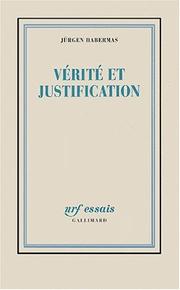
ISBN: 2070757889 9782070757886 Year: 2001 Publisher: Paris : Gallimard,
Abstract | Keywords | Export | Availability | Bookmark
 Loading...
Loading...Choose an application
- Reference Manager
- EndNote
- RefWorks (Direct export to RefWorks)
Jürgen Habermas, on le sait, tient l'usage de communication du langage pour constitutif de la vie sociale : il définit les normes, les valeurs, les rôles nécessaires à toute communauté, il est ce sans quoi il n'y aurait pas même de société possible. Or, cette théorie critique de la morale, du droit et de la démocratie s'appuie sur une pragmatique du langage, elle requiert l'explicitation des catégories qui rendent possible l'entente rationnelle avec autrui à propos de la vérité des faits, de la justesse des actes et des normes : vérité et objectivité, réalité et référence, validité et rationalité. Ces catégories, Habermas les reprend aujourd'hui du point de vue de la philosophie théorique, passée au second plan, chez lui, depuis Connaissance et intérêt (1976). Ici, donc, nulle dissertation métaphysique sur la vérité de l'être, épistémologique sur la connaissance des objets, ou sémantique sur la forme des propositions énonciatives ; mais la formulation nouvelle de deux questions clés pour la philosophie. D'une part, la question ontologique du naturalisme : comment concilier la contingence du développement historique et naturel des formes de la vie socioculturelle avec la normativité - inéluctable du point de vue des participants à l'activité communicationnelle et propre à un monde vécu structuré par le langage, dans lequel nous nous trouvons " toujours déjà " en tant que sujets capables de parler et d'agir ? D'autre part, la question épistémologique du réalisme : comment concilier le postulat d'un monde indépendant de nos descriptions et identique pour tous les observateurs, avec la découverte de la philosophie du langage, selon laquelle nous ne disposons d'aucun accès direct, non médiatisé par le langage, à la réalité " nue " ? Deux questions qui permettent à Habermas - au terme d'une explication serrée avec les plus récents développements de la philosophie analytique et du pragmatisme américain - de penser à nouveaux frais le rapport entre philosophie théorique et philosophie pratique.
Truth --- Justification (Theory of knowledge) --- Philosophy --- Vérité --- Justification (Théorie de la connaissance) --- Philosophie --- Verite --- Justification (Morale) --- Philosophy. --- Vérité --- Justification (Théorie de la connaissance) --- Philosophie - 20e siecle --- Habermas, Jurgen (1929-....) --- Justification (épistémologie) --- Idéalisme allemand --- Philosophie du langage --- Pragmatisme Communication --- Pensée politique et sociale
Book
ISBN: 8831174401 Year: 2001 Publisher: Roma Città Nuova
Abstract | Keywords | Export | Availability | Bookmark
 Loading...
Loading...Choose an application
- Reference Manager
- EndNote
- RefWorks (Direct export to RefWorks)
Christianity and politics --- Justification (Christian theology) --- History of doctrines --- Catholic Church --- Bishops.
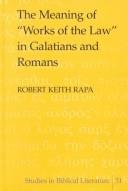
ISBN: 0820451193 Year: 2001 Publisher: New York (N.Y.): Lang
Abstract | Keywords | Export | Availability | Bookmark
 Loading...
Loading...Choose an application
- Reference Manager
- EndNote
- RefWorks (Direct export to RefWorks)
Jewish law --- Justification (Christian theology) --- Law (Theology) --- Biblical teaching --- Bible. --- Criticism, interpretation, etc.
Book
ISBN: 3161469941 9783161469947 Year: 2001 Volume: 140 Publisher: Tübingen Mohr Siebeck
Abstract | Keywords | Export | Availability | Bookmark
 Loading...
Loading...Choose an application
- Reference Manager
- EndNote
- RefWorks (Direct export to RefWorks)
Jewish religious literature --- Covenants --- Judaism --- Justification --- History and criticism --- Religious aspects --- History of doctrines --- History --- Paul --- Views on Judaism --- 227.08 --- -Jewish religious literature --- -Covenants --- -Justification --- Faith and justification --- Justification by faith --- Salvation --- Agreements --- Religious literature, Jewish --- Jewish literature --- Religious literature --- Jews --- Religions --- Semites --- Paulinische theologie --- -History and criticism --- -Judaism --- -History of doctrines --- Christianity --- Religion --- Paul the Apostle, Saint --- -Views on Judaism --- 227.08 Paulinische theologie --- Jewish religious literature - History and criticism --- Covenants - Religious aspects - Judaism - History of doctrines --- Judaism - History - Post-exilic period, 586 B.C.-210 A.D. --- Paul - Views on Judaism
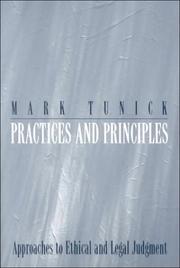
ISBN: 0691070792 0691227438 Year: 2001 Publisher: Princeton (N.J.) : Princeton University Press,
Abstract | Keywords | Export | Availability | Bookmark
 Loading...
Loading...Choose an application
- Reference Manager
- EndNote
- RefWorks (Direct export to RefWorks)
A Japanese woman living in California attempts parent-child suicide, an ancient Japanese custom called "oyako-shinju," in order to rid herself of shame upon learning that her husband has a mistress. She survives, but her two children are drowned in the attempt. Since her attempt was made in accordance with the standards of Japanese culture, should she be tried by the standards and laws of the United States? Are there universally valid moral principles that dictate what is right? Or are moral judgments culturally relative, ultimately dictated by conventions and practices that vary among societies? In Practices and Principles, Mark Tunick takes up the debate between universalists and relativists, and, in political philosophy, between communitarians and liberals, each of which has roots in an earlier debate between Kant and Hegel. Tunick focuses on three case studies: promises, contract law, and the Fourth Amendment issue of privacy. In his analysis, he rejects both uncritical deference to social practice and draconian adherence to principles when making legal and ethical judgments. He argues that we do not always need to choose between abstract principles and social practices. Sometimes we appeal to both; sometimes we need to appeal to shared social norms; and sometimes, where there is no ethical community, we can appeal only to principles. Ultimately, Tunick rejects simplified arguments that force us to choose between either practices or principles, universalism or relativism, and liberalism or communitarianism.
Hegel, Georg Wilhelm Friedrich --- Amsterdam, Anthony. --- Ardal, Pall. --- Aristotle. --- Becarria, Cesare. --- Berlin, Isaiah. --- Brennan, Justice William J. --- Burke, Edmund. --- Caste system. --- Caveat emptor. --- Collins, Hugh. --- Contract law issues. --- Craswell, Richard. --- Deceit. --- Defense of Marriage Act. --- Detrimental reliance. --- Duelling. --- Eavesdropping. --- Eisenberg, Melvin. --- Exposure of infants. --- Feinman, Jay. --- Frederick II of Prussia. --- Gardbaum, Stephen. --- Gilliam, John. --- Godwin, William. --- Grotius. --- Haggling. --- Hardimon, Michael. --- Hicks, Granville. --- Hume, David. --- Immanent criticism. --- Justification, levels of. --- Kant’s categorical imperative. --- Kant’s principle conception. --- Kronman, Anthony. --- Language games. --- Liberalism. --- Liberty-limiting principles. --- MacCormick, Neil. --- MacNeil, Ian. --- Maternal loyalty. --- Matthews, Justice Stanley. --- Native Americans. --- Natural wrongs. --- Oakeshott, Michael. --- O’Hagan, Timothy. --- Peter the Great. --- Polygamy. --- Power, Robert. --- Promissory estoppel. --- Relativism. --- Self-immolation. --- oyako-shinju.
| Listing 1 - 8 of 8 |
Sort by
|

 Search
Search Feedback
Feedback About UniCat
About UniCat  Help
Help News
News